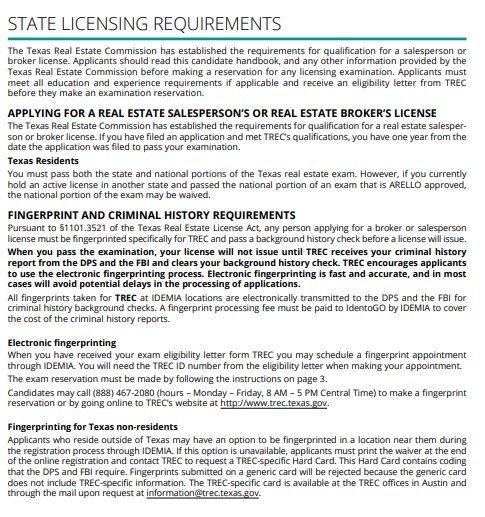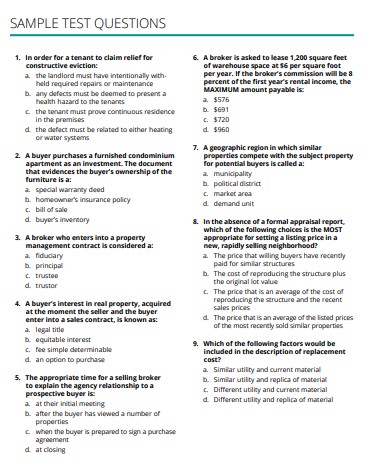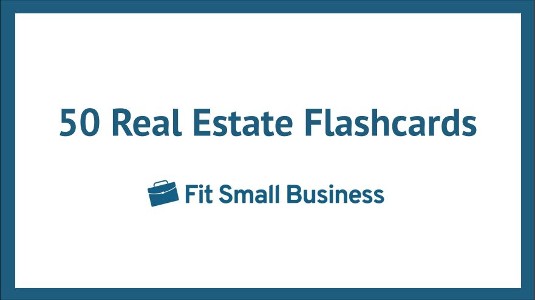Real estate flashcards are a tried-and-true way of mastering common topics and concepts for your licensing exam. Your flashcards should include questions and terminologies covering property ownership, financing, contracts, real estate calculations, and other subjects from your prelicensing coursework. Test your knowledge against our video flashcards or download our 50 free real estate flashcards containing definitions, true or false statements, common acronyms, and real estate vocabulary.
Even though your exam will contain only multiple-choice questions, studying flashcards for real estate exam prep will ensure you retain all the knowledge you need to pass your exam.
In addition, PrepAgent’s online flashcards are a fun way to learn crucial real estate terms. The arrangement of the terms varies for a different experience each time a student views the flashcard section of the portal. The flashcard user interface separates the name from its description using two unique colors (blue and green). The digital cards also flip from front to back, simulating the physical or printable real estate flashcard experience.
Tips for Passing the Real Estate Exam
Studying for any exam can be daunting, especially with a busy schedule and distractions that can divert your attention. Nevertheless, you must set aside time to study for your real estate exam to avoid spending more time and money retaking it. Also, the sooner you pass the exam, the sooner you’ll be able to start a successful real estate career.
In addition to using real estate exam flashcards, here are study tips to use that will improve your understanding and memory:
- Take notes on paper
- Schedule short periods of focused study
- Study a little bit every day
- Read out loud to improve memory
- Take a walk before your real estate exam
- Use mnemonic devices
- Remove distractions
- Study with friends
It’s also necessary to think about your test strategies on the actual day of the exam. Multiple-choice questions can be tricky if you’re not focused and relaxed, especially when you have a time frame to complete them. Answer the questions you know first and temporarily skip the difficult questions. After you’ve gone through the entire test, return to the difficult questions you skipped. Use strategies like the process of elimination to get rid of answers that you know are wrong and then take your best guess of which remaining answer is correct.
State-specific Information & Exam Contents
Every state provides its aspiring real estate agents with a Candidate Handbook when registering for the real estate license exam. The Handbook provides information on licensing requirements, scheduling the exam, and the structure and contents that will be on the test. Reviewing sample questions from your state-specific Candidate Handbook is an effective method of studying and quizzing yourself before exam day.
To find the Candidate Handbook specific to your state, visit How to Get a Real Estate License in Every State, click the state on the map, and read the “How to Get a Real Estate License” article for your state.


Example pages from the Texas Candidate Handbook
The Handbook will also break down the categories you’ll be tested on and the number of questions per category you’ll be expected to know. This information is valuable for real estate agents to understand the overall structure and areas of focus for the exam, but also to determine the areas that need improvement before test day. These commonly tested categories are:
- Property ownership and land use controls and regulations
- Laws of agency and fiduciary duties
- Property valuation and financial analysis
- Financing
- Transfer of property
- Practice of real estate and disclosures
- Contracts
Real Estate Schools That Provide Flashcards & Other Study Tools
In addition to studying on your own, many agents invest in an online real estate study program to prepare for the exam. Among real estate exam flashcards, online real estate providers offer many other tools, like audio, videos, practice tests, study guides, and real estate definitions, for the exam. Here are a few of the best real estate exam study providers:
Schools | ||||
|---|---|---|---|---|
Best For | Aspiring agents who need additional study time | Most affordable real estate exam preparation | Prelicensing courses that include exam prep | Real estate professionals who want to study via a mobile app |
Key Features |
|
|
|
|
Starting Price | $59 | $39 | Varies per state | $59 |
Learn More | or | or |
Bottom Line
Using real estate flashcards is an effective way to prepare for your licensing exam. Download our 50 real estate vocabulary flashcards and combine them with other tools, like sample questions and testing tips, to guarantee you’re exuding confidence on exam day.
